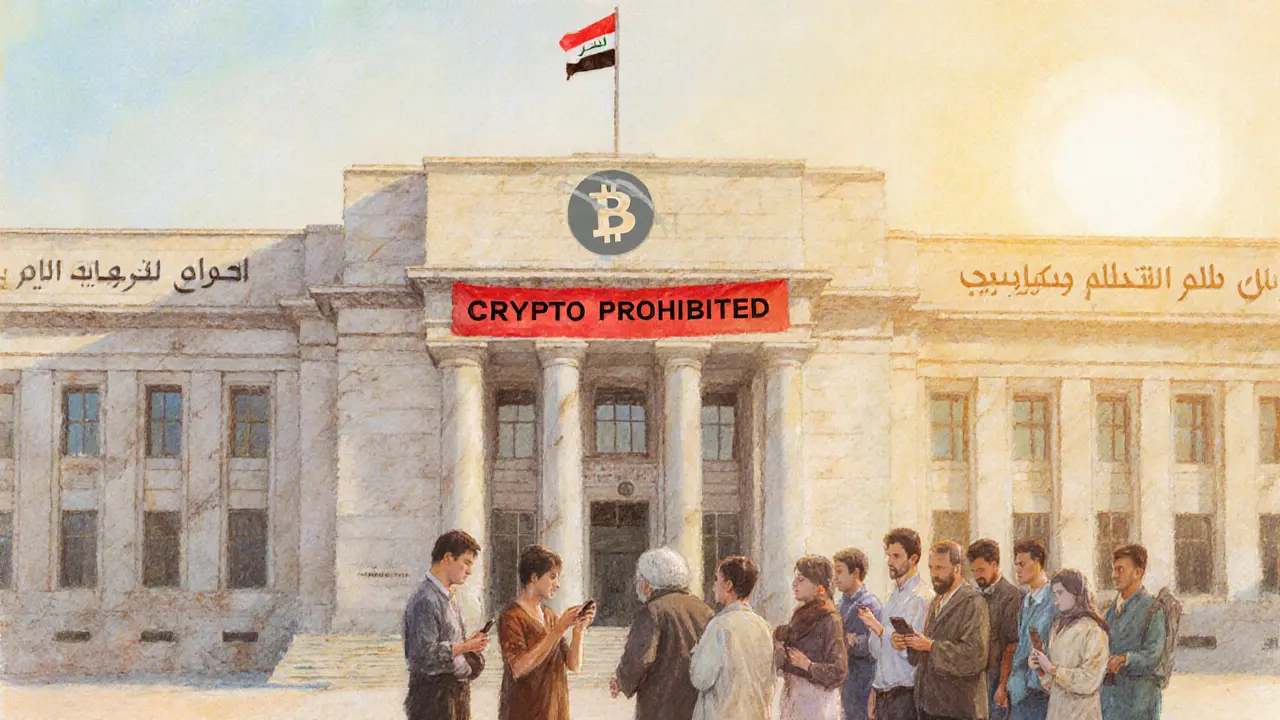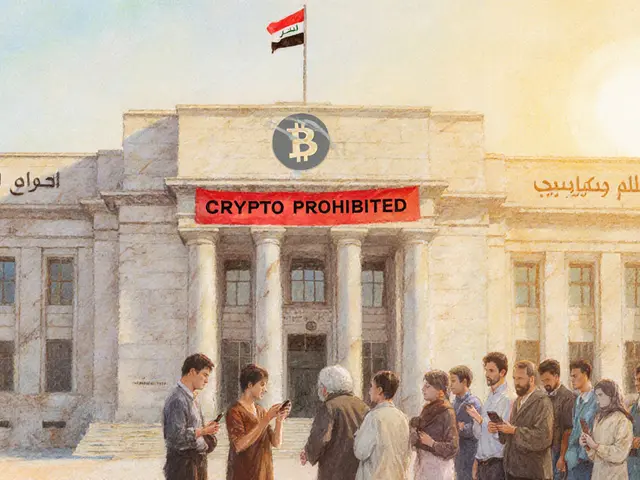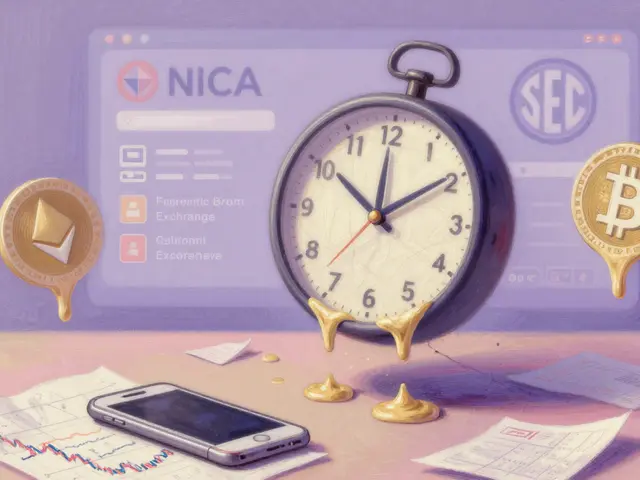Iraq’s Central Bank Crypto Ban: Rules, Enforcement & CBDC Plans

Iraq Crypto Policy Checker
Cryptocurrency transactions are Prohibited in Iraq.
Private ownership is Allowed, but use through regulated institutions is banned.
The Central Bank Digital Currency (CBDC) is in Research Phase.
- CBI Circular No. 125/5/9 (Nov 22, 2021)
- March 26, 2022 Directive (FATF-aligned)
- Ban on payment cards and e-wallets for crypto
Compliance Summary
Iraq is developing a Central Bank Digital Dinar (CBDC) to:
- Reduce cash leakage and printing costs
- Enable real-time monitoring of spending trends
- Strengthen AML controls
- Promote financial inclusion
Scheduled for pilot launch in 2025.
When the Central Bank of Iraq (Central Bank of Iraq is the country’s monetary authority that oversees banks, payment providers and the overall financial system), it decided in 2017 to draw a hard line against digital assets. By 2025, Iraq sits among just ten nations that maintain a total prohibition on cryptocurrency transactions. This article unpacks the legal framework, how the ban hits banks and everyday users, why enforcement is patchy, and what the government’s parallel push for a state‑run Central Bank Digital Currency (CBDC) tells us about its long‑term vision.
Legal Backbone of the Crypto Ban
The ban rests on two cornerstone documents:
- CBI Circular No. 125/5/9 (Nov222021) - This circular makes it clear that any supervised financial institution - banks, non‑bank intermediaries and electronic payment service providers - may not conduct, facilitate or even advise on transactions involving virtual assets. The circular also declares that cryptocurrencies have no legal tender status in Iraq, meaning they can’t be used to settle debts or obligations.
- March262022 Directive - Aligning Iraq’s policy with the latest Financial Action Task Force (FATF) recommendations, the directive adds mandatory enhanced‑due‑diligence (EDD) procedures, internal policy reviews and a blanket ban on using payment cards or e‑wallets for speculative crypto trading.
Both documents are binding on all entities that fall under the CBI’s supervision. Violating them can result in administrative sanctions, revocation of licences and hefty fines.
How the Ban Affects Financial Institutions
Every bank, from the state‑owned Rafidain Bank to private players like Kurdistan International Bank, must:
- Disable any internal system that can process crypto‑related payments.
- Train compliance teams to flag suspicious crypto‑related transactions under AML (Anti‑Money Laundering) rules.
- Report any detected crypto activity to the CBI’s Financial Intelligence Unit.
The operational overhead is sizable. A 2023 survey of Iraqi banks reported an average 12‑hour weekly increase in compliance workload solely for crypto‑related monitoring.
What About Individual Users?
Interestingly, the law does not criminalise personal ownership of crypto. The gray area emerges because:
- There is no explicit criminal code provision that bans possession.
- AML legislation can still target individuals if they move crypto through the formal banking system.
- Enforcement against private users remains inconsistent - most raids focus on organized “underground” exchanges rather than lone holders.
In practice, many Iraqis still trade Bitcoin or USDT via peer‑to‑peer channels on apps like Telegram. While the CBI lacks the technical capacity to monitor every private wallet, the risk of AML investigations looms, especially for high‑value transfers.
Religious Backing of the Ban
The ban aligns with religious edicts that view crypto as speculative and potentially haram. In 2018, the Supreme Fatwa Authority of the Kurdistan Regional Government issued a ruling against the OneCoin scheme, labeling it fraudulent and religiously prohibited. This religious endorsement bolsters public perception that crypto is not just illegal but also culturally undesirable.
Why Iraq Is Pursuing a State‑Run CBDC
While private digital assets are barred, Iraq is actively researching a Central Bank Digital Currency. In March2025, Mazhar Mohammed Saleh - financial advisor to the Prime Minister - announced a pilot for a state‑controlled digital dinar. The projected benefits include:
- Reducing cash leakage and printing costs.
- Enhancing real‑time monitoring of spending trends.
- Improving AML controls by making every transaction traceable.
- Fostering financial inclusion for the 40% of the population without bank accounts.
In essence, the CBDC is a way for the CBI to capture the efficiencies of digital money while keeping full sovereign control - a stark contrast to the open, permission‑less nature of cryptocurrencies.

Macro‑Economic Context Behind the Strict Stance
Iraq’s financial system struggles with severe liquidity constraints. Deposits represent only 8.8% of the total money supply, and the monthly budgetary need hovers around 18-20trillion dinars. The 2020 devaluation of the dinar from 1,182 to 1,450 per US$ sparked public unrest as food prices surged. These pressures push policymakers toward tools that can tighten monetary control, explaining the simultaneous ban on private crypto and the push for a CBDC.
International Comparisons
| Country | Legal Status of Crypto | Ban Scope | Enforcement Focus | CBDC Status |
|---|---|---|---|---|
| Iraq | Prohibited | Full ban on banks, payment providers, and card/e‑wallet use | Institutional compliance; limited individual raids | Research phase, pilot announced 2025 |
| China | Prohibited (exchange & mining) | Ban on trading platforms, mining; crypto payments banned | Aggressive crackdown on exchanges, arrests | Digital Yuan in limited rollout |
| United States | Legal, regulated | None - compliance under AML/KYC | SEC, FinCEN oversight; enforcement on fraud | No federal CBDC yet (research ongoing) |
| European Union | Legal, MiCA framework | Regulated under licensing | Supervisory authority checks | Multiple pilots (e.g., Eurozone CBDC studies) |
| United Arab Emirates | Legal, regulated | Licensing for exchanges, custodians | ADGM and DFSA oversight | Abu Dhabi CBDC trial (Digi‑Dinar) |
The table shows that Iraq’s blanket prohibition is among the most stringent globally, while many jurisdictions are moving toward regulated acceptance.
Human Rights & Legal Concerns
Human rights observers warn that a state‑run CBDC could become a surveillance tool. The Human Rights Foundation’s CBDC Tracker rates Iraq low on financial freedom (4.38/10) and flags potential misuse of transaction data to curb dissent. Legal analysts at Al Nesoor Law Firm argue that without a balanced approach, Iraq risks creating a “legal vacuum” where private crypto remains illegal but un‑enforced, while the CBDC tightens state oversight.
Practical Takeaways for Stakeholders
- Banks & FinTechs: Update compliance manuals to reference Circular No.125/5/9 and the 2022 FATF‑aligned directive. Conduct quarterly internal audits of crypto‑related controls.
- Investors: Avoid routing crypto trades through Iraqi financial institutions. Use offshore wallets or peer‑to‑peer channels, but stay aware of AML exposure if you ever need to convert to dinars.
- Policy Makers: Consider a phased licensing model rather than an outright ban, to capture innovation while preserving AML safeguards.
- General Public: Holding crypto isn’t a crime, but moving it through banks can trigger investigations. Keep transactions small and document sources.
Future Outlook
With the CBDC pilot slated for late 2025, Iraq may soon have a government‑issued digital currency that co‑exists with the ban on private crypto. If the CBDC rollout proves successful, the CBI could use the platform to demonstrate the benefits of digital money-speed, lower costs, anti‑fraud tools-while keeping the narrative that uncontrolled crypto is too risky for the Iraqi economy.
Frequently Asked Questions
Is owning Bitcoin illegal in Iraq?
Owning Bitcoin is not expressly criminalised, but using any regulated bank or payment service to buy, sell or transfer it breaches CBI Circular No.125/5/9. Individuals may hold crypto privately, yet moving it through the formal financial system can trigger AML investigations.
What penalties do banks face for violating the crypto ban?
Banks can face licence suspensions, heavy fines (often in the high‑six‑figure range in Iraqi dinars), and mandatory corrective action plans imposed by the CBI. Repeated violations may lead to revocation of banking licences.
How does the upcoming Iraqi CBDC differ from private cryptocurrencies?
The CBDC will be issued and fully governed by the Central Bank, meaning every transaction is traceable and subject to AML/KYC checks. Private crypto operates on decentralized networks with pseudonymous addresses, offering no direct control to the state.
Will the crypto ban affect foreign investors in Iraq?
Foreign investors must use approved Iraqi banks for any fiat transactions. Attempting to funnel crypto through local banks will breach the ban, potentially jeopardising the investor’s operating licence and leading to fines.
How does Iraq’s crypto policy compare to its neighbours?
Most neighbours-Saudi Arabia, UAE, and Jordan-adopt licensing regimes that allow crypto exchanges under strict supervision. Iraq, by contrast, enforces a total ban on institutional crypto activity while still researching a state‑run digital currency.







Crypto is basically a no‑go for banks in Iraq and that’s why you see the heavy paperwork.
When you look at the circulars, it’s all about protecting the dinar from the volatility that crypto brings, which is a valid concern but also stifles fintech innovation.
Honestly the ban feels like a relic from a pre‑digital era, a top‑down decree that ignores the grassroots crypto culture blooming on Telegram.
That grassroots vibe is exactly why the CBI should consider a sandbox approach rather than a blanket prohibition.
The government’s heavy‑handed stance is just a scare tactic and it hurts real people who want to diversify their savings.
It’s not about scaring anyone, it’s about protecting national sovereignty and preventing capital flight.
Think about it – the Central Bank of Iraq has put a full stop on any institutional crypto activity, yet they are pouring resources into a state‑run digital dinar. That juxtaposition tells you a lot about their priorities. By banning private crypto, the CBI eliminates a wild, unregulated market that could undermine the monetary policy they intend to craft with the CBDC. At the same time, a government‑issued digital currency gives them full visibility over every transaction, which is a massive win for AML compliance. The ban also aligns with religious edicts that label speculative assets as haram, so the policy has cultural backing too. However, the enforcement is patchy – raids target only organized exchanges, while ordinary holders on peer‑to‑peer platforms slip through the cracks. This creates a legal gray zone where ownership is technically allowed but any movement through banks triggers investigations. For banks, the compliance burden has risen sharply, with weekly hours devoted to crypto monitoring now topping a dozen hours per branch. From an investor’s standpoint, the safest route is to keep crypto off the books and use offshore wallets if you must trade, but that adds its own risk profile. The upcoming CBDC pilot in 2025 promises lower transaction costs and real‑time tracking, but it also centralizes power in a way that many crypto enthusiasts fear. If the pilot succeeds, Iraq could showcase a model where the state harnesses digital money without ceding control to the private sector. Still, the lack of a licensing framework for private crypto means the country is missing out on potential fintech growth, job creation, and innovation that neighboring UAE and Saudi Arabia are beginning to capture. In short, the ban is a double‑edged sword: it protects the dinar from volatility while stifling a burgeoning digital economy.
Wow, that was a novel‑length rant – love the drama but also kinda scary how much control they want.
Removing crypto from the formal sector might look like protectionism, but it also silences a lot of legitimate financial empowerment.
From a regulatory perspective, the prohibition aligns with FATF recommendations, yet the lack of clear criminalization for possession creates interpretative ambiguity.
It's wild how the state wants a digital dinar while flashing a ‘no crypto’ sign on the door.
Sure, the CBDC can be a miracle for surveillance, but it's also a radical departure from the free‑spirit that crypto promised.
The ban seems overly cautious; maybe a tiered licensing system would balance risk and innovation.
Exactly! A balanced approach could let startups thrive while keeping AML safeguards 👍
Honestly, the whole thing feels like a plot twist in a dystopian novel – state‑run money, banned private crypto, all while the world moves on.
It does read like fiction, yet the policy decisions have very real implications for financial inclusion and personal liberty.
Everyone’s singing about inclusion while the regime tightens its grip – classic double‑talk.
True, the narrative of inclusion feels like a façade when the surveillance tools get stronger.
We should keep an eye on how Iraq’s CBDC rollout influences other emerging markets – could set a precedent.